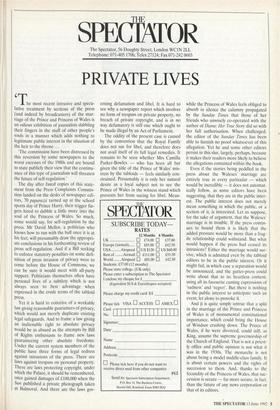SPECTATOR
The Spectator, 56 Doughty Street, London WC1N 2LL Telephone: 071-405 1706; Telex 27124; Fax 071-242 0603
PRIVATE LIVES
The most recent intrusive and specu- lative treatment by sections of the press (and indeed by broadcasters) of the mar- riage of the Prince and Princess of Wales is an odious exhibition of journalists dabbling their fingers in the stuff of other people's souls in a manner which adds nothing to legitimate public interest in the situation of the heir to the throne ...
'The commission have been distressed by this reversion by some newspapers to the worst excesses of the 1980s and are bound to state publicly their view that the continu- ance of this type of journalism will threaten the future of self-regulation.'
The day after faxed copies of this state- ment from the Press Complaints Commis- sion landed on the desks of newspaper edi- tors, 70 paparazzi turned up at the school sports day of Prince Harry, their trigger fin- gers hired to dabble a little more into the soul of the Princess of Wales. So much, some would say, for self-regulation by the press. Mr David Mellor, a politician who knows how to run with the ball once it is at his feet, will presumably draw the appropri- ate conclusions in his forthcoming review of press self-regulation. And if a Bill seeking to enforce statutory penalties on some defi- nition of press invasion of privacy were to come before the House of Commons, we can be sure it would meet with all-party support. Politicians themselves often have personal lives of a subtlety which is not always seen to best advantage when expressed in the crude terms of the tabloid press.
Yet it is hard to conceive of a workable law giving reasonable guarantees of privacy, which would not merely duplicate existing legal safeguards. And to frame a law giving an inalienable right to absolute privacy would be as absurd as the attempts by Bill of Rights enthusiasts to frame new laws guaranteeing other absolute freedoms. Under the current system members of the public have three forms of legal redress against intrusions of the press. There are laws against trespass on personal property. There are laws protecting copyright, under which the Palace, it should be remembered, once gained damages of £100,000 when the Sun published a private photograph taken at Balmoral. And there are the laws gov-
erning defamation and libel. It is hard to see why a newspaper report which involves no form of trespass on private property, no breach of private copyright, and is in no way defamatory is still one which ought to be made illegal by an Act of Parliament.
The oddity of the present case is caused by the convention that the Royal Family does not sue for libel, and therefore does not avail itself of its full legal remedies. It remains to be seen whether Mrs Camilla Parker-Bowles — who has been all but given the title of the Prince of Wales' mis- tress by the tabloids — feels similarly con- strained. Presumably it is only her natural desire as a loyal subject not to see the Prince of Wales in the witness stand which prevents her from sueing for libel. Mean while the Princess of Wales feels obliged to absorb in silence the calumny propagated by the Sunday Times that those of her friends who unwisely co-operated with the author of Diana: Her True Story did so with her full authorisation. When challenged, the editor of the Sunday Times has been able to furnish no proof whatsoever of this allegation. Yet he and some other editors persist in this slur, largely, perhaps, because it makes their readers more likely to believe the allegations contained within the book.
Even if the stories being peddled in the press about the Waleses' marriage are entirely true in every particular — which would be incredible — it does not automat- ically follow, as some editors have been suggesting, that they are in the public inter- est. The public interest does not merely mean something in which the public, or a section of it, is interested. Let us suppose, for the sake of argument, that the Waleses' marriage is in trouble. If the press contin- ues to hound them it is likely that the added pressure would be more than a frag- ile relationship could withstand. But what would happen if the press had ceased its intrusions? Either the marriage would sur- vive, which is admitted even by the tabloid editors to be in the public interest. Or it might fail, in which case a separation would be announced, and the gutter-press could write about that to its heartless content, using all its favourite canting expressions of 'sadness' and 'regret'. But there is nothing in the public interest to anticipate such an event, let alone to provoke it.
And it is quite simply untrue that a split in the marriage of the Prince and Princess of Wales is of monumental constitutional importance, which could bring the House of Windsor crashing down. The Prince of
Wales, if he were divorced, could still, as King, assume the supreme governorship of the Church of England. That is not a priest-
ly office and public opinion is not what it was in the 1930s. The monarchy is not about being a model middle-class family. It is about certain powers and the rights of succession to them. And,. thanks to the fecundity of the Princess of Wales, that suc- cession is secure — far more secure, in fact, than the future of any news corporation or that of its editors.


















































 Previous page
Previous page